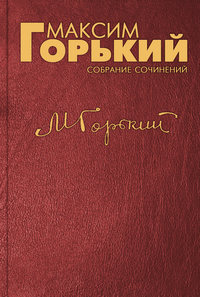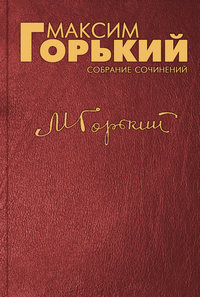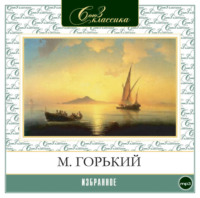 полная версия
полная версияThe Man Who Was Afraid
“Brethren!” shouted the stout fellow. “Let’s strike up the student song. Well, one, two!”
“Swift as the waves,”Someone roared in his bass voice:
“Are the days of our life.”“Friends!” said Yozhov, rising to his feet, a glass in his hand. He staggered, and leaned his other hand against Foma’s head. The started song was broken off, and all turned their heads toward him.
“Working men! Permit me to say a few words, words from the heart. I am happy in your company! I feel well in your midst. That is because you are men of toil, men whose right to happiness is not subject to doubt, although it is not recognised. In your ennobling midst, Oh honest people, the lonely man, who is poisoned by life, breathes so easily, so freely.”
Yozhov’s voice quivered and quaked, and his head began to shake. Foma felt that something warm trickled down on his hand, and he looked up at the wrinkled face of Yozhov, who went on speaking, trembling in every limb:
“I am not the only one. There are many like myself, intimidated by fate, broken and suffering. We are more unfortunate than you are, because we are weaker both in body and in soul, but we are stronger than you because we are armed with knowledge, which we have no opportunity to apply. We are gladly ready to come to you and resign ourselves to you and help you to live. There is nothing else for us to do! Without you we are without ground to stand on; without us, you are without light! Comrades! we were created by Fate itself to complete one another!”
“What does he beg of them?” thought Foma, listening to Yozhov’s words with perplexity. And examining the faces of the compositors he saw that they also looked at the orator inquiringly, perplexedly, wearily.
“The future is yours, my friends!” said Yozhov, faintly, shaking his head mournfully as though feeling sorry for the future, and yielding to these people against his will the predominance over it. “The future belongs to the men of honest toil. You have a great task before you! You have to create a new culture, everything free, vital and bright! I, who am one of you in flesh and in spirit; who am the son of a soldier; I propose a toast to your future! Hurrah!”
Yozhov emptied his glass and sank heavily to the ground. The compositors unanimously took up his broken exclamation, and a powerful, thundering shout rolled through the air, causing the leaves on the trees to tremble.
“Let’s start a song now,” proposed the stout fellow again.
“Come on!” chimed in two or three voices. A noisy dispute ensued as to what to sing. Yozhov listened to the noise, and, turning his head from one side to another, scrutinized them all.
“Brethren,” Yozhov suddenly cried again, “answer me. Say a few words in reply to my address of welcome.”
Again – though not at once – all became silent, some looking at him with curiosity, others concealing a grin, still others with an expression of dissatisfaction plainly written on their faces. And he again rose from the ground and said, hotly:
“Two of us here are cast away by life – I and that other one. We both desire the same regard for man and the happiness of feeling ourselves useful unto others. Comrades! And that big, stupid man – ”
“Nikolay Matveyich, you had better not insult our guest!” said someone in a deep, displeased voice.
“Yes, that’s unnecessary,” affirmed the stout fellow, who had invited Foma to the fireside. “Why use offensive language?”
A third voice rang out loudly and distinctly:
“We have come together to enjoy ourselves – to take a rest.”
“Fools!” laughed Yozhov, faintly. “Kind-hearted fools! Do you pity him? But do you know who he is? He is of those people who suck your blood.”
“That will do, Nikolay Matveyich!” they cried to Yozhov. And all began to talk, paying no further attention to him. Foma felt so sorry for his friend that he did not even take offence. He saw that these people who defended him from Yozhov’s attacks were now purposely ignoring the feuilleton-writer, and he understood that this would pain Yozhov if he were to notice it. And in order to take his friend away from possible unpleasantness, he nudged him in the side and said, with a kind-hearted laugh:
“Well, you grumbler, shall we have a drink? Or is it time to go home?”
“Home? Where is the home of the man who has no place among men?” asked Yozhov, and shouted again: “Comrades!”
Unanswered, his shout was drowned in the general murmur. Then he drooped his head and said to Foma:
“Let’s go from here.”
“Let’s go. Though I don’t mind sitting a little longer. It’s interesting. They behave so nobly, the devils. By God!”
“I can’t bear it any longer. I feel cold. I am suffocating.”
“Well, come then.”
Foma rose to his feet, removed his cap, and, bowing to the compositors, said loudly and cheerfully:
“Thank you, gentlemen, for your hospitality! Good-bye!”
They immediately surrounded him and spoke to him persuasively:
“Stay here! Where are you going? We might sing all together, eh?”
“No, I must go, it would be disagreeable to my friend to go alone. I am going to escort him. I wish you a jolly feast!”
“Eh, you ought to wait a little!” exclaimed the stout fellow, and then whispered:
“Some one will escort him home!”
The consumptive also remarked in a low voice:
“You stay here. We’ll escort him to town, and get him into a cab and – there you are!”
Foma felt like staying there, and at the same time was afraid of something. While Yozhov rose to his feet, and, clutching at the sleeves of his overcoat, muttered:
“Come, the devil take them!”
“Till we meet again, gentlemen! I’m going!” said Foma and departed amid exclamations of polite regret.
“Ha, ha, ha!” Yozhov burst out laughing when he had got about twenty steps away from the fire. “They see us off with sorrow, but they are glad that I am going away. I hindered them from turning into beasts.”
“It’s true, you did disturb them,” said Foma. “Why do you make such speeches? People have come out to enjoy themselves, and you obtrude yourself upon them. That bores them!”
“Keep quiet! You don’t understand anything!” cried Yozhov, harshly. “You think I am drunk? It’s my body that is intoxicated, but my soul is sober, it is always sober; it feels everything. Oh, how much meanness there is in the world, how much stupidity and wretchedness! And men – these stupid, miserable men.”
Yozhov paused, and, clasping his head with his hands, stood for awhile, staggering.
“Yes!” drawled out Foma. “They are very much unlike one another. Now these men, how polite they are, like gentlemen. And they reason correctly, too, and all that sort of thing. They have common sense. Yet they are only labourers.”
In the darkness behind them the men struck up a powerful choral song. Inharmonious at first, it swelled and grew until it rolled in a huge, powerful wave through the invigorating nocturnal air, above the deserted field.
“My God!” said Yozhov, sadly and softly, heaving a sigh. “Whereby are we to live? Whereon fasten our soul? Who shall quench its thirsts for friendship brotherhood, love, for pure and sacred toil?”
“These simple people,” said Foma, slowly and pensively, without listening to his companion s words, absorbed as he was in his own thoughts, “if one looks into these people, they’re not so bad! It’s even very – it is interesting. Peasants, labourers, to look at them plainly, they are just like horses. They carry burdens, they puff and blow.”
“They carry our life on their backs,” exclaimed Yozhov with irritation. “They carry it like horses, submissively, stupidly. And this submissiveness of theirs is our misfortune, our curse!”
And Foma, carried away by his own thought, argued:
“They carry burdens, they toil all their life long for mere trifles. And suddenly they say something that wouldn’t come into your mind in a century. Evidently they feel. Yes, it is interesting to be with them.”
Staggering, Yozhov walked in silence for a long time, and suddenly he waved his hand in the air and began to declaim in a dull, choking voice, which sounded as though it issued from his stomach:
“Life has cruelly deceived me, I have suffered so much pain.”
“These, dear boy, are my own verses,” said he, stopping short and nodding his head mournfully. “How do they run? I’ve forgotten. There is something there about dreams, about sacred and pure longings, which are smothered within my breast by the vapour of life. Oh!”
“The buried dreams within my breast Will never rise again.”
“Brother! You are happier than I, because you are stupid. While I – ”
“Don’t be rude!” said Foma, irritated. “You would better listen how they are singing.”
“I don’t want to listen to other people’s songs,” said Yozhov, with a shake of the head. “I have my own, it is the song of a soul rent in pieces by life.”
And he began to wail in a wild voice:
“The buried dreams within my breast Will never rise again… How great their number is!”
“There was a whole flower garden of bright, living dreams and hopes. They perished, withered and perished. Death is within my heart. The corpses of my dreams are rotting there. Oh! oh!”
Yozhov burst into tears, sobbing like a woman. Foma pitied him, and felt uncomfortable with him. He jerked at his shoulder impatiently, and said:
“Stop crying! Come, how weak you are, brother!” Clasping his head in his hand Yozhov straightened up his stooping frame, made an effort and started again mournfully and wildly:
“How great their number is! Their sepulchre how narrow! I clothed them all in shrouds of rhyme And many sad and solemn songs O’er them I sang from time to time!”
“Oh, Lord!” sighed Foma in despair. “Stop that, for Christ’s sake! By God, how sad!”
In the distance the loud choral song was rolling through the darkness and the silence. Some one was whistling, keeping time to the refrain, and this shrill sound, which pierced the ear, ran ahead of the billow of powerful voices. Foma looked in that direction and saw the tall, black wall of forest, the bright fiery spot of the bonfire shining upon it, and the misty figures surrounding the fire. The wall of forest was like a breast, and the fire like a bloody wound in it. It seemed as though the breast was trembling, as the blood coursed down in burning streams. Embraced in dense gloom from all sides the people seemed on the background of the forest, like little children; they, too, seemed to burn, illuminated by the blaze of the bonfire. They waved their hands and sang their songs loudly, powerfully.
And Yozhov, standing beside Foma, spoke excitedly:
“You hard-hearted blockhead! Why do you repulse me? You ought to listen to the song of the dying soul, and weep over it, for, why was it wounded, why is it dying? Begone from me, begone! You think I am drunk? I am poisoned, begone!”
Without lifting his eyes off the forest and the fire, so beautiful in the darkness, Foma made a few steps aside from Yozhov and said to him in a low voice:
“Don’t play the fool. Why do you abuse me at random?”
“I want to remain alone, and finish singing my song.”
Staggering, he, too, moved aside from Foma, and after a few seconds again exclaimed in a sobbing voice:
“My song is done! And nevermoreShall I disturb their sleep of death,Oh Lord, Oh Lord, repose my soul!For it is hopeless in its wounds,Oh Lord, repose my soul.”Foma shuddered at the sounds of their gloomy wailing, and he hurried after Yozhov; but before he overtook him the little feuilleton-writer uttered a hysterical shriek, threw himself chest down upon the ground and burst out sobbing plaintively and softly, even as sickly children cry.
“Nikolay!” said Foma, lifting him by the shoulders. “Cease crying; what’s the matter? Oh Lord. Nikolay! Enough, aren’t you ashamed?”
But Yozhov was not ashamed; he struggled on the ground, like a fish just taken from the water, and when Foma had lifted him to his feet, he pressed close to Foma’s breast, clasping his sides with his thin arms, and kept on sobbing.
“Well, that’s enough!” said Foma, with his teeth tightly clenched. “Enough, dear.”
And agitated by the suffering of the man who was wounded by the narrowness of life, filled with wrath on his account, he turned his face toward the gloom where the lights of the town were glimmering, and, in an outburst of wrathful grief, roared in a deep, loud voice:
“A-a-ana-thema! Be cursed! Just wait. You, too, shall choke! Be cursed!”
CHAPTER XI
“LUBAVKA!” said Mayakin one day when he came home from the Exchange, “prepare yourself for this evening. I am going to bring you a bridegroom! Prepare a nice hearty little lunch for us. Put out on the table as much of our old silverware as possible, also bring out the fruit-vases, so that he is impressed by our table! Let him see that each and everything we have is a rarity!”
Lubov was sitting by the window darning her father’s socks, and her head was bent low over her work.
“What is all this for, papa?” she asked, dissatisfied and offended.
“Why, for sauce, for flavour. And then, it’s in due order. For a girl is not a horse; you can’t dispose of her without the harness.”
All aflush with offence, Lubov tossed her head nervously, and flinging her work aside, cast a glance at her father; and, taking up the socks again, she bent her head still lower over them. The old man paced the room to and fro, plucking at his fiery beard with anxiety; his eyes stared somewhere into the distance, and it was evident that he was all absorbed in some great complicated thought. The girl understood that he would not listen to her and would not care to comprehend how degrading his words were for her. Her romantic dreams of a husband-friend, an educated man, who would read with her wise books and help her to find herself in her confused desires, these dreams were stifled by her father’s inflexible resolution to marry her to Smolin. They had been killed and had become decomposed, settling down as a bitter sediment in her soul. She had been accustomed to looking upon herself as better and higher than the average girl of the merchant class, than the empty and stupid girl who thinks of nothing but dresses, and who marries almost always according to the calculation of her parents, and but seldom in accordance with the free will of her heart. And now she herself is about to marry merely because it was time, and also because her father needed a son-in-law to succeed him in his business. And her father evidently thought that she, by herself, was hardly capable of attracting the attention of a man, and therefore adorned her with silver. Agitated, she worked nervously, pricked her fingers, broke needles, but maintained silence, being aware that whatever she should say would not reach her father’s heart.
And the old man kept on pacing the room to and fro, now humming psalms softly, now impressively instructing his daughter how to behave with the bridegroom. And then he also counted something on his fingers, frowned and smiled.
“Mm! So! Try me, Oh Lord, and judge me. From the unjust and the false man, deliver me. Yes! Put on your mother’s emeralds, Lubov.”
“Enough, papa!” exclaimed the girl, sadly. “Pray, leave that alone.”
“Don’t you kick! Listen to what I’m telling you.”
And he was again absorbed in his calculations, snapping his green eyes and playing with his fingers in front of his face.
“That makes thirty-five percent. Mm! The fellow’s a rogue. Send down thy light and thy truth.”
“Papa!” exclaimed Lubov, mournfully and with fright.
“What?”
“You – are you pleased with him?”
“With whom?
“Smolin.”
“Smolin? Yes, he’s a rogue, he’s a clever fellow, a splendid merchant! Well, I’m off now. So be on your guard, arm yourself.”
When Lubov remained alone she flung her work aside and leaned against the back of her chair, closing her eyes tightly. Her hands firmly clasped together lay on her knees, and their fingers twitched. Filled with the bitterness of offended vanity, she felt an alarming fear of the future, and prayed in silence:
“My God! Oh Lord! If he were only a kind man! Make him kind, sincere. Oh Lord! A strange man comes, examines you, and takes you unto himself for years, if you please him! How disgraceful that is, how terrible. Oh Lord, my God! If I could only run away! If I only had someone to advise me what to do! Who is he? How can I learn to know him? I cannot do anything! And I have thought, ah, how much I have thought! I have read. To what purpose have I read? Why should I know that it is possible to live otherwise, so as I cannot live? And it may be that were it not for the books my life would be easier, simpler. How painful all this is! What a wretched, unfortunate being I am! Alone. If Taras at least were here.”
At the recollection of her brother she felt still more grieved, still more sorry for herself. She had written to Taras a long, exultant letter, in which she had spoken of her love for him, of her hope in him; imploring her brother to come as soon as possible to see his father, she had pictured to him plans of arranging to live together, assuring Taras that their father was extremely clever and understood everything; she told about his loneliness, had gone into ecstasy over his aptitude for life and had, at the same time, complained of his attitude toward her.
For two weeks she impatiently expected a reply, and when she had received and read it she burst out sobbing for joy and disenchantment. The answer was dry and short; in it Taras said that within a month he would be on the Volga on business and would not fail to call on his father, if the old man really had no objection to it. The letter was cold, like a block of ice; with tears in her eyes she perused it over and over again, rumpled it, creased it, but it did not turn warmer on this account, it only became wet. From the sheet of stiff note paper which was covered with writing in a large, firm hand, a wrinkled and suspiciously frowning face, thin and angular like that of her father, seemed to look at her.
On Yakov Tarasovich the letter of his son made a different impression. On learning the contents of Taras’s reply the old man started and hastily turned to his daughter with animation and with a peculiar smile:
“Well, let me see it! Show it to me! He-he! Let’s read how wise men write. Where are my spectacles? Mm! ‘Dear sister!’ Yes.”
The old man became silent; he read to himself the message of his son, put it on the table, and, raising his eyebrows, silently paced the room to and fro, with an expression of amazement on his countenance. Then he read the letter once more, thoughtfully tapped the table with his fingers and spoke:
“That letter isn’t bad – it is sound, without any unnecessary words. Well? Perhaps the man has really grown hardened in the cold. The cold is severe there. Let him come, we’ll take a look at him. It’s interesting. Yes. In the psalm of David concerning the mysteries of his son it is said: ‘When Thou hast returned my enemy’ – I’ve forgotten how it reads further. ‘My enemy’s weapons have weakened in the end, and his memory hath perished amid noise. Well, we’ll talk it over with him without noise.”
The old man tried to speak calmly and with a contemptuous smile, but the smile did not come; his wrinkles quivered irritably, and his small eyes had a particularly clear brilliancy.
“Write to him again, Lubovka. ‘Come along!’ write him, ‘don’t be afraid to come!’”
Lubov wrote Taras another letter, but this time it was shorter and more reserved, and now she awaited a reply from day to day, attempting to picture to herself what sort of man he must be, this mysterious brother of hers. Before she used to think of him with sinking heart, with that solemn respect with which believers think of martyrs, men of upright life; now she feared him, for he had acquired the right to be judge over men and life at the price of painful sufferings, at the cost of his youth, which was ruined in exile. On coming, he would ask her:
“You are marrying of your own free will, for love, are you not?”
What should she tell him? Would he forgive her faint-heartedness? And why does she marry? Can it really be possible that this is all she can do in order to change her life?
Gloomy thoughts sprang up one after another in the head of the girl and confused and tortured her, impotent as she was to set up against them some definite, all-conquering desire. Though she was in an anxious and compressing her lips. Smolin rose from his chair, made a step toward her and bowed respectfully. She was rather pleased with this low and polite bow, also with the costly frock coat, which fitted Smolin’s supple figure splendidly. He had changed but slightly – he was the same red-headed, closely-cropped, freckled youth; only his moustache had become long, and his eyes seemed to have grown larger.
“Now he’s changed, eh?” exclaimed Mayakin to his daughter, pointing at the bridegroom. And Smolin shook hands with her, and smiling, said in a ringing baritone voice:
“I venture to hope that you have not forgotten your old friend?”
“It’s all right! You can talk of this later,” said the old man, scanning his daughter with his eyes.
“Lubova, you can make your arrangements here, while we finish our little conversation. Well then, African Mitrich, explain yourself.”
“You will pardon me, Lubov Yakovlevna, won’t you?” asked Smolin, gently.
“Pray do not stand upon ceremony,” said Lubov. “He’s polite and clever,” she remarked to herself; and, as she walked about in the room from the table to the sideboard, she began to listen attentively to Smolin’s words. He spoke softly, confidently, with a simplicity, in which was felt condescendence toward the interlocutor. “Well then, for four years I have carefully studied the condition of Russian leather in foreign markets. It’s a sad and horrid condition! About thirty years ago our leather was considered there as the standard, while now the demand for it is constantly falling off, and, of course, the price goes hand in hand with it. And that is perfectly natural. Lacking the capital and knowledge all these small leather producers are not able to raise their product to the proper standard, and, at the same time, to reduce the price. Their goods are extremely bad and dear. And they are all to blame for having spoiled Russia’s reputation as manufacturer of the best leather. In general, the petty producer, lacking the technical knowledge and capital, is consequently placed in a position where he is unable to improve his products in proportion to the development of the technical side. Such a producer is a misfortune for the country, the parasite of her commerce.”
“Hm!” bellowed the old man, looking at his guest with one eye, and watching his daughter with the other. “So that now your intention is to build such a great factory that all the others will go to the dogs?”
“Oh, no!” exclaimed Smolin, warding off the old man’s words with an easy wave of the hand. “Why wrong others? What right have I to do so? My aim is to raise the importance and price of Russian leather abroad, and so equipped with the knowledge as to the manufacture, I am building a model factory, and fill the markets with model goods. The commercial honour of the country!”
“Does it require much capital, did you say?” asked Mayakin, thoughtfully.
“About three hundred thousand.”
“Father won’t give me such a dowry,” thought Lubov.
“My factory will also turn out leather goods, such as trunks, foot-wear, harnesses, straps and so forth.”
“And of what per cent, are you dreaming?”
“I am not dreaming, I am calculating with all the exactness possible under conditions in Russia,” said Smolin, impressively. “The manufacturer should be as strictly practical as the mechanic who is creating a machine. The friction of the tiniest screw must be taken into consideration, if you wish to do a serious thing seriously. I can let you read a little note which I have drawn up, based upon my personal study of cattle-breeding and of the consumption of meat in Russia.”
“How’s that!” laughed Mayakin. “Bring me that note, it’s interesting! It seems you did not spend your time for nothing in Western Europe. And now, let’s eat something, after the Russian fashion.”
“How are you passing the time, Lubov Yakovlevna?” asked Smolin, arming himself with knife and fork.
“She is rather lonesome here with me,” replied Mayakin for his daughter. “My housekeeper, all the household is on her shoulders, so she has no time to amuse herself.”









